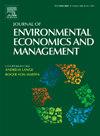Is broader trading welfare improving for emission trading systems?
IF 5.9
3区 经济学
Q1 BUSINESS
Journal of Environmental Economics and Management
Pub Date : 2025-01-10
DOI:10.1016/j.jeem.2024.103110
引用次数: 0
Abstract
Emission trading systems are cornerstone policies to reduce carbon emissions. Although economic intuition suggests that broader allowance trading should be welfare improving, this paper proves that view can be wrong. Under an increasingly popular type of emissions trading scheme — tradable performance standards (TPS), multiple narrow markets can decrease emissions relative to a single unified market, so that restricting trade does not always harm welfare. We show analytically that, when intensity benchmarks are heterogeneous within a sector, this result can hold even if the well-known “implicit output subsidy” does not impact total output. Finally, we provide evidence that this concern can be of high practical relevance. Using a general equilibrium model of China’s TPS for 2020–2030, we show that broader trading results in significantly higher emissions (up to 10%), and decreases welfare relative to narrower markets when the social cost of carbon exceeds $91/tCO.
更广泛的交易福利是否改善了排放交易体系?
排放权交易制度是减少碳排放的基石政策。尽管经济学直觉表明,更广泛的配额交易应该是福利的改善,但本文证明了这种观点可能是错误的。在一种日益流行的排放交易计划——可交易绩效标准(TPS)下,相对于单一的统一市场,多个狭窄的市场可以减少排放,因此限制贸易并不总是损害福利。我们分析表明,当强度基准在一个部门内是异质的,即使众所周知的“隐性产出补贴”不影响总产出,这一结果也成立。最后,我们提供的证据表明,这种关注可能具有很高的实际意义。利用中国2020-2030年TPS的一般均衡模型,我们发现,当碳的社会成本超过91美元/吨二氧化碳时,更广泛的交易导致排放量显著增加(高达10%),并且相对于更狭窄的市场,福利水平下降。
本文章由计算机程序翻译,如有差异,请以英文原文为准。
求助全文
约1分钟内获得全文
求助全文
来源期刊
CiteScore
8.00
自引率
4.30%
发文量
91
期刊介绍:
The Journal of Environmental Economics and Management publishes theoretical and empirical papers devoted to specific natural resources and environmental issues. For consideration, papers should (1) contain a substantial element embodying the linkage between economic systems and environmental and natural resources systems or (2) be of substantial importance in understanding the management and/or social control of the economy in its relations with the natural environment. Although the general orientation of the journal is toward economics, interdisciplinary papers by researchers in other fields of interest to resource and environmental economists will be welcomed.

 求助内容:
求助内容: 应助结果提醒方式:
应助结果提醒方式:


